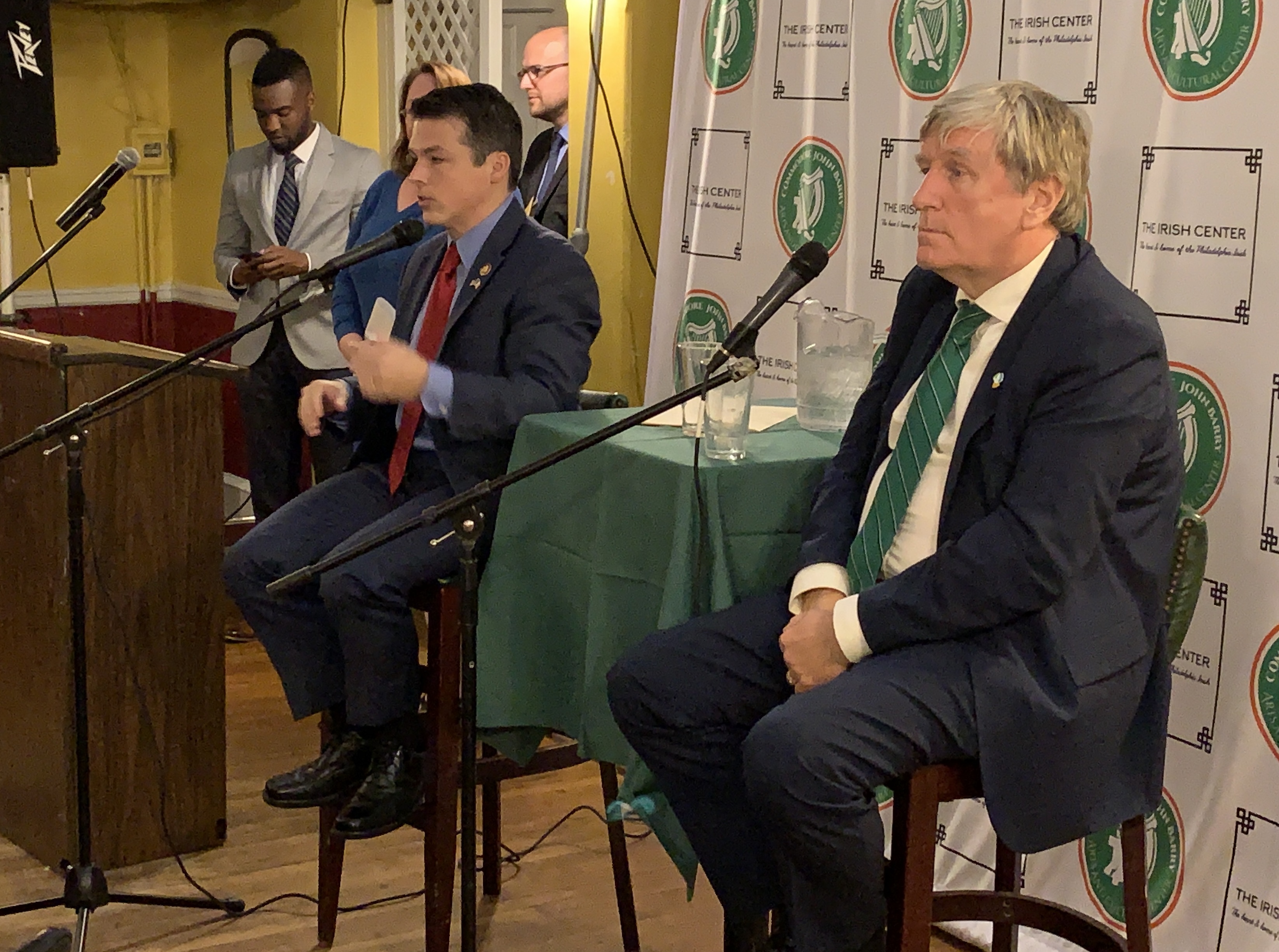As the days wind down toward a Halloween deadline, Boris Johnson’s Brexit plans seem to shift with the political winds.
Two questions of pressing concern to Ireland remain unsettled:
Will the United Kingdom’s exit from the European Union result in a hard customs border between Northern Ireland and the Republic of Ireland?
What will be the impact on the Northern Ireland peace process, as codified in the 1998 Good Friday Agreement?
If a Monday night emergency meeting at the Philadelphia Irish Center is any indication, there is keen local interest in the answers to both.
The Center’s Fireside Room was filled wall-to-wall with local Irish and Irish-Americans eager to hear from Ireland Ambassador to the United States Daniel Mulhall and local Congressman Brendan F. Boyle (D-02).
The European Union and the Irish government aim to prevent a hard border, with checkpoints and controls, between the North and the Republic—which could be the result if the UK crashes out of the European Union without an agreement. This is the key sticking point between the UK and the EU. (The EU this week rejected out of hand a new UK proposal relating to the border.)
Rep. Boyle described this particular period as nothing short of perilous.
“I think it’s important that our friends and relatives and relations anywhere on the island of Ireland know that we here in Philadelphia and this district, and any part of the world, are standing with the people of Ireland at this important moment to avoid what would be quite clearly and obviously the precipice of a crisis,” Rep. Boyle said.
He described a recent visit by a congressional delegation to meet with government representatives in both the UK and Ireland, which culminated, he said, in a walk along the border between Derry and Donegal. A Brexit that would result in a hard border between the North and the Republic would, he said, be both asinine and dangerous.
“It’s not just me saying it, not just the Irish government saying it, but security experts from the head of the PSNI (Police Service of Northern Ireland) to two UNESCO experts, to other international security experts who have all reached the same conclusion,” Rep. Boyle said. “You are playing with fire. ‘You,’ being what the British government and those who are the most enthusiastic Brexiteers are proposing right now.”
On this side of the Atlantic, President Trump has proposed a “very big trade deal” with the UK post-Brexit. But Boyle said such an offer will never pass muster in Congress in the absence of an agreement that preserves an open customs border—what the EU refers to as a “backstop”—and the preservation of peace in Northern Ireland. “We must never go back to those days … never,” he said, to a chorus of agreement from the audience.
Ambassador Mulhall explained how the conversation between Ireland and the UK has played out thus far.
“’Backstop’ sounds like a baseball term,” Ambassador Mulhall said, “but it’s actually an insurance policy. What it means is that the backstop is only used if all other solutions fail. The British government has said, ‘No problem, there won’t be any need for a border because we’re going to have a close trading relationship between the EU and the UK. And there will be no borders anywhere between the UK and the European Union. And we’ve said, ‘Great, we love that. That would solve our problem completely. But what if we can’t reach an agreement?’ They said, ‘Well, in that case, we will use technology.’ And we’ve asked, OK, can you give us an example of how this kind of thing actually works anywhere else in the world?’ And their answer has been, ‘Well, no, but we think we’ll be able to come up with it sometime in the future.’ And we’ve said, ‘Fine … but what if that doesn’t work? What if that doesn’t happen?’”
Up to this point, Ambassador Mulhall said, there has been no satisfactory answer.
Mulhall closed with a plea to his audience, and to all members of the Irish diaspora and the Irish-American community.
“We need you now,’ Ambassador Mulhall told his audience, “as much as we’ve ever needed you, in my view. Because we’re facing one of the most difficult things we’ve had to deal with over the last hundred years as an independent country. Because there’s the potential for this to cause severe economic damage and to set back the cause of peace and reconciliation in Ireland, very seriously indeed.”
For his part, Rep. Boyle urged members of the audience to make their concerns clear to their representatives in Congress.
“Look up your members of Congress. It’s very easy,” he said. “It takes a second online, or please give them a call. It makes a real impact. We need folks now more than ever as it’s getting down to crunch time.”

